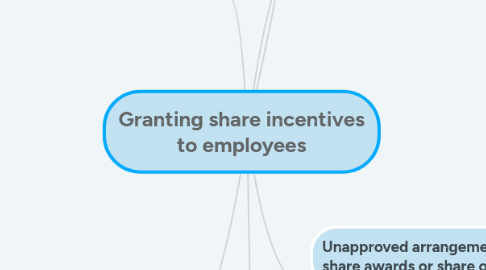
1. Tax-advantaged schemes
1.1. All-employee schemes
1.1.1. SIP and SAYE
1.1.2. More suited to larger (quoted) companies
1.2. Discretionary schemes
1.2.1. EMI and CSOP
1.2.2. Can be tailored to specific circumstances
1.2.3. EMI for smaller, trading companies/groups only
2. Tax treatment of unapproved arrangements
2.1. Share awards
2.1.1. May be 'upfront' income tax charge on acquisition
2.1.2. Generally expect to secure CGT treatment upon sale
2.1.3. But can be further income tax events during ownership/upon sale
2.1.4. NICs if RCAs
2.1.5. Tax/NICs payable through PAYE if RCAs
2.1.6. Be alert to possible benefit-in-kind charge if RCAs
2.2. Share options
2.2.1. No tax on grant
2.2.2. Income tax on exercise
2.2.2.1. NICs if RCAs
2.2.2.2. Tax/NICs payable through PAYE if RCAs
2.2.2.3. Be alert to possible benefit-in-kind charge if RCAs
3. Advising the client
4. Unapproved arrangements
4.1. Share awards
4.1.1. Likely to be 'restricted securities'
4.1.1.1. Fully-paid (ordinary) shares
4.1.1.2. 'Nil-paid' shares
4.1.1.3. 'Growth shares'
4.1.2. Significance of s. 431 elections
4.1.3. DOTAS considerations?
4.2. Share options
4.2.1. 'Exit only' options?
4.2.2. Performance criteria
4.2.3. s. 431 election still relevant on exercise
4.3. But note: always consider use of tax-advantaged EMI, if company/group qualifies
5. Unapproved arrangements - share awards or share options?
5.1. Relative complexity of share awards
5.1.1. Amending Articles of Association
5.1.2. Shareholders' Agreement?
5.2. Significance of current share value
5.2.1. Nominal or low value - share awards more straightforward from tax perspective
5.2.2. Higher values - options or more complex share awards (to avoid or minimise upfront tax)?
